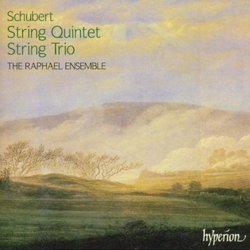Deeply sensitive and marvelously expressed Schubert.
Jeffrey Lee | Asheville area, NC USA | 03/05/2004
(5 out of 5 stars)
"Schubert's C Major Quintet is doubtless one of the truly great masterpieces of the chamber music literature. However, I personally feel that to uphold this status, groups executing it must absolutely be attuned to its deeply expressive musical attributes. Some who have recorded the work have "missed the boat" because they have chosen to overemphasize its technical aspects. Others have displayed overall a cool or superficial approach. There is no good reason why both musical sensitivity and mechanical prowess cannot be combined in producing a more complete, satisfying statement. This piece deserves as much. All of which brings me to a consideration of such a performance--that given by the Raphael Ensemble, whose very fine work I have commented on before. I find it has the measure of this important piece principally because of its intimate involvement with it. The tone of the first movement is set immediately with an appropriate degree of sadness that is marginally more effective than that supplied by the Emerson Quartet with Rostropovich in terms of revealing Schubert's plight while confronting his impending demise. (For those unaware, Schubert died of complications from syphilis at age 31.) But where Emerson and company proceed to focus strongly on the unfolding dynamics of the first movement, the Raphael Ensemble underscores its personal side. While not quite as taut in its presentation, its slightly more leisurely approach allows Schubert's melodies to bloom. Some of the sweet melodic fragments are revealed in a way that gives the entire movement a freer, more satisfying expression. (At this point, I want to mention that I also listened once more to the often highly praised account of the Alban Berg Quartet with Heinrich Schiff, and found its presentation relatively superficial emotionally. Moreover, those forces did not seem to play with quite the same sense of ease as the other two. And, by contrast, their violins sounded comparatively thin.) The Quintet's second movement adagio might constitute the primary expressive element of the entire work. It seems to portend powerfully the composer's impending fate. Here, the Raphael deftly senses the deep sadness, bittersweetness and eventual resignation. There is a very troubling moment in this movement which provides the basis for an interesting contrast in musical styles between the Emerson and the Raphael. Where the former communicates an almost fearful anxiety, the latter opts for a more intensely tragic feel. In the third movement, with its heroic sounding theme, the Emerson plays with dash and boldness, but so does the Raphael, which also is able to deliver a more musical reading. Contrastingly, the Emerson sounds a bit sterile. Despite all that he has experienced earlier, the composer is able to proceed with a lively folk-like tune for the final movement, replete with some of his characteristic charm. Nonetheless, underlying the seeming pleasantries, there are traces of the troubled Schubert. The dissimilar elements are communicated alertly and insightfully by the Raphael. It seems as if some of the more carefree aspects cannot break free from the lurking "nightmare" of tragedy and finality. The music rushes to a conclusion, ringing with its haunting, valedictory notes of despair.
The earlier String Trio Movement is sheer Schubertian winsomeness. (There are a few shades of Beethoven.) The Raphael plays it with color and style. In sum, an extremely fine disc. Despite the several outstanding accomplishments of this wonderful ensemble, I have neither seen nor heard much from it lately in terms of more recent releases on the Hyperion label. Record wise, I certainly hope it has not been earmarked for abandonment. That would be a real shame."

